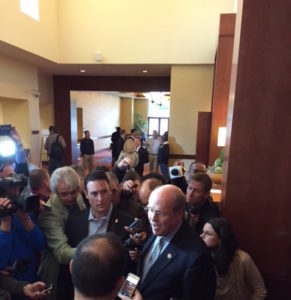By Zach Wagner | @zachwagner22
Sports Capital Journalism Program
SCOTTSDALE, Ariz. – College Football Playoff executive director Bill Hancock said that the schedule at the end of the next two seasons will go on as planned as organizers analyze the decline in television ratings for the recent semifinal games played on New Year’s Eve.

Bill Hancock, College Football Playoff executive director, addresses questions on the future of the New Year’s Six games on Jan. 8. (Photo by Malcolm Moran)
“I don’t want you to read too much into the numbers,” he told reporters. “We’re not going to. We are not making decisions based on one bad year.”
Three days before the second National Championship, Hancock said the issue contributing to the decline – weekday games on December 31 – would not become a factor again until the end of the 2018 season.
“I don’t anticipate any changes for next year,” said Hancock. “Saturday is New Year’s Eve, the year after that we go back to New Year’s Day and the year after that we will have to evaluate how to deal with the four-day weekend.”
Clemson’s victory over Oklahoma and Alabama’s dominant performance against Michigan State on December 31 led to an average rating of 9.8, drop of 36 percent from the semifinal games played on January 1, 2015.
“I was surprised,” Hancock said. “We thought the numbers would be down a bit, but they were down far more than I anticipated.”
Last year, the first semifinals played under the four-team championship format, the telecasts of the Rose Bowl Game and Sugar Bowl became the two largest audiences in the history of cable television. The Rose Bowl Game had a rating of 14.8, and the Sugar Bowl had a rating of 15.2.
Under the 12-year contract with ESPN reportedly worth $7.3 billion, semifinal games are scheduled to take place on New Year’s Eve in seven of the next ten years.
The schedule was necessitated by previously-established agreements between ESPN and the Sugar Bowl and Rose Bowl Games that anchor a New Year’s Day starting time after 8 p.m. eastern time for the kickoff in New Orleans and 5 p.m. eastern time for the start in Pasadena.
The rotation of semifinal games will return to Pasadena and New Orleans on January 1 of 2018, 2021 and 2024.
In the other years, when the semifinals are held in Arlington, Texas and Miami, or Atlanta and Glendale, Arizona, the New Year’s Eve dates are necessary to avoid conflicts with the Rose Bowl Game and Sugar Bowl.
Hancock pointed to other factors he believed played a large role in the decline in ratings.
“We know what the factors were,” said Hancock. “Star Wars was probably a factor. The weather outside was nice. The fact is that we got a little unlucky, which we will look to improve upon next time.”
Hancock hopes that a more detailed analysis of the ratings will provide more information.
“I’m like a coach who says I have to wait and see the video before I know what happened,” he said.
The executive director cited a significant improvement in another area: The increased audience from digital platforms. The Orange and Cotton Bowls ranked second and fourth, respectively, for unique viewers on the WatchESPN broadcasts among all sporting events other than the World Cup soccer tournament.
“Hidden in all of this, was ESPN’s reporting that their digital and mobile numbers were off the charts,” said Hancock. “…People are focused on the TV numbers, as well they should be, but over time were going to see continued growth in those digital numbers.”
The hope, Hancock said, is for a matchup between top-ranked, undefeated Clemson and an Alabama team seeking its fourth national championship in seven seasons to produce a memorable championship night.
“I think there’s a lot of excitement in having the number one undefeated team all year long, against what some are calling the Yankees of college football,” he said. “It’s a great match.”


